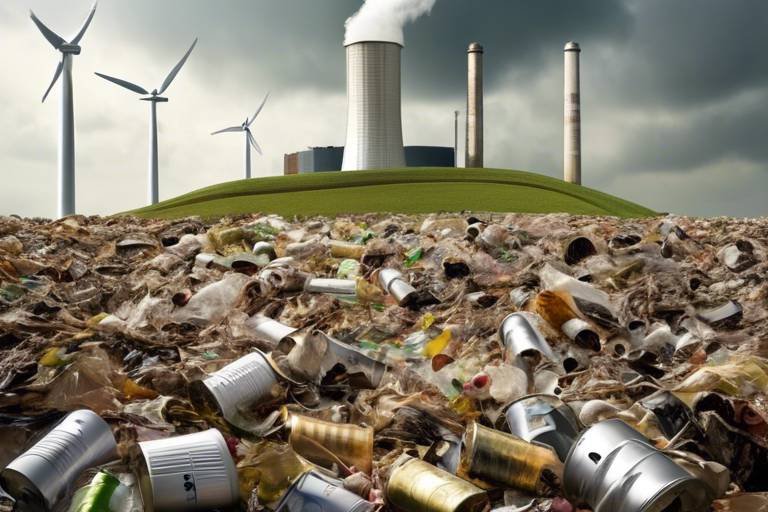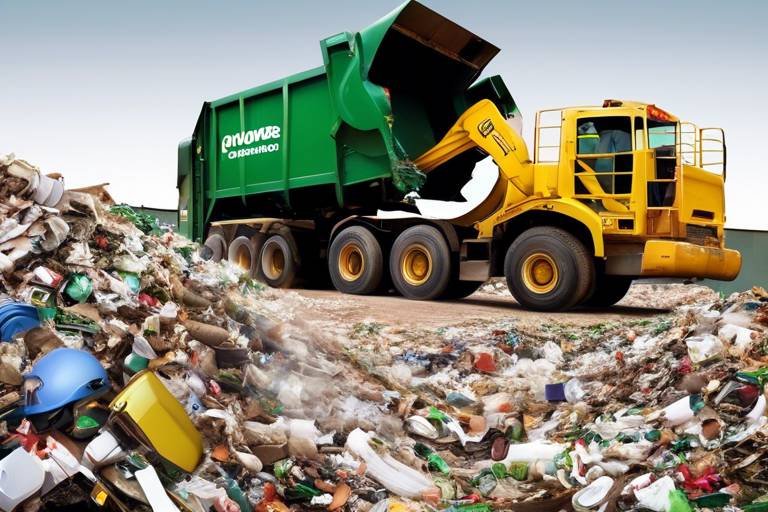How Can Hotels Implement Sustainable Waste Management?
In today's world, where environmental concerns are at an all-time high, hotels have a critical role to play in promoting sustainable waste management practices. You might be wondering, how can hotels effectively reduce their waste footprint while still providing exceptional service to their guests? The answer lies in a combination of innovative strategies, staff and guest engagement, and a commitment to eco-friendly initiatives. By adopting sustainable waste management practices, hotels not only contribute to the planet's health but also enhance their reputation and attract environmentally conscious travelers.
First and foremost, understanding the unique challenges hotels face in waste management is essential. Hotels generate a significant amount of waste due to their operations, including food waste, packaging materials, and single-use items. These challenges require tailored waste management solutions that not only comply with regulations but also resonate with the hotel's brand values. Implementing a comprehensive waste management system can be a game changer, leading to reduced waste generation and increased recycling efforts.
But why should hotels care about sustainable waste management? The benefits are multifaceted. Not only does it lead to cost savings through reduced disposal fees and operational efficiencies, but it also enhances guest satisfaction. Today’s travelers are increasingly looking for eco-friendly accommodations, and hotels that prioritize sustainability can stand out in a crowded market. A positive environmental impact can also foster loyalty among guests who appreciate and support green initiatives.
Now, let’s dive into some practical strategies that hotels can implement to achieve sustainable waste management. One effective method is through cost reduction strategies. For instance, hotels can minimize waste by purchasing in bulk, which reduces packaging waste and lowers costs. Additionally, composting organic waste not only diverts it from landfills but also provides nutrient-rich compost that can be used in landscaping or even in hotel gardens.
Another vital aspect of sustainable waste management is establishing robust recycling initiatives. Hotels can set up clearly marked recycling stations throughout the property, making it easy for both staff and guests to sort recyclable materials. Best practices include training staff on proper recycling techniques and regularly monitoring the recycling program's effectiveness to ensure continuous improvement.
Furthermore, composting solutions can play a significant role in managing organic waste. By implementing a composting system, hotels can significantly reduce their landfill contributions. This not only helps the environment but also allows hotels to create their own nutrient-rich soil for landscaping or gardening, promoting a closed-loop system that benefits the hotel ecosystem.
Engaging both staff and guests in these initiatives is crucial. Hotels can foster a culture of environmental responsibility by conducting workshops and training sessions for staff, empowering them to take ownership of waste management practices. For guests, simple actions like encouraging them to reuse towels or providing information on recycling can make a big difference. A little engagement goes a long way in creating a community focused on sustainability.
In conclusion, sustainable waste management in hotels is not just a trend; it’s a vital practice that benefits the environment, the hotel’s bottom line, and guest satisfaction. By implementing innovative strategies, engaging staff and guests, and fostering a culture of sustainability, hotels can lead the way in responsible waste management. As we move forward, it is essential for the hospitality industry to embrace these practices and set an example for others to follow.
- What are the first steps a hotel can take to implement sustainable waste management?
Start by assessing current waste generation, setting clear goals, and engaging staff in training programs. - How can hotels encourage guests to participate in waste management efforts?
Provide clear information about recycling and composting initiatives, and offer incentives for guests who participate. - Are there financial benefits to implementing sustainable waste management?
Yes, hotels can save money through reduced waste disposal fees and increased operational efficiency, along with attracting more eco-conscious guests.

Understanding Waste Management in Hotels
Waste management in hotels is a complex yet crucial aspect of running a sustainable hospitality business. Hotels generate a significant amount of waste daily, from food scraps to packaging materials, and understanding how to manage this waste effectively is essential for both operational efficiency and environmental responsibility. The hospitality industry faces unique challenges, such as fluctuating guest numbers, diverse waste types, and the need for immediate service, all of which complicate waste management efforts. However, with the right strategies in place, hotels can not only reduce their waste footprint but also enhance their overall sustainability profile.
One of the primary principles of waste management in hotels is the hierarchy of waste management, which prioritizes waste prevention over disposal. This means that hotels should first focus on reducing waste at the source, followed by reusing materials, recycling, and finally, responsible disposal methods. For instance, hotels can minimize single-use plastics by offering refillable water stations and encouraging guests to bring their own reusable containers. By adopting such practices, hotels can significantly decrease the volume of waste generated.
Moreover, effective waste management requires a comprehensive understanding of the different types of waste produced in hotels, which can be categorized into several groups:
- Organic Waste: This includes food scraps, yard waste, and other biodegradable materials.
- Recyclable Waste: Items such as paper, cardboard, glass, and certain plastics fall into this category.
- Hazardous Waste: This includes chemicals, batteries, and other materials that require special handling.
- General Waste: Non-recyclable and non-compostable items that end up in landfills.
Understanding these categories allows hotels to tailor their waste management strategies accordingly. For example, by implementing a robust recycling program, hotels can divert a significant portion of their waste from landfills, thereby contributing to a circular economy. Additionally, hotels can partner with local recycling facilities to ensure that materials are processed correctly and efficiently.
Another critical element of waste management in hotels is staff training and engagement. Employees play a vital role in the successful implementation of waste management practices. By educating staff on the importance of sustainability and providing them with the tools and knowledge to manage waste effectively, hotels can create a culture of environmental responsibility. Regular training sessions, workshops, and updates on best practices can empower staff to take initiative in reducing waste.
In conclusion, understanding waste management in hotels is not just about compliance with regulations; it's about embracing a sustainable future. By recognizing the unique challenges and opportunities within the hospitality industry, hotels can implement effective waste management strategies that not only benefit their bottom line but also contribute positively to the environment. It's a win-win situation that every hotel should strive for.

Benefits of Sustainable Waste Management
When it comes to running a hotel, the phrase "one man's trash is another man's treasure" takes on a whole new meaning. Implementing sustainable waste management practices isn't just a trendy buzzword; it’s a vital strategy that can transform a hotel’s operations and its impact on the environment. By embracing these eco-friendly practices, hotels can experience a myriad of benefits that extend far beyond just reducing waste. Let's dive into some of the most compelling advantages.
First and foremost, sustainable waste management can lead to significant cost savings. Hotels often generate a staggering amount of waste, from food scraps to packaging materials. By adopting practices such as bulk purchasing, hotels can reduce the amount of packaging waste generated. Additionally, composting organic waste not only minimizes what ends up in landfills but also provides a cost-effective way to manage waste. Imagine turning your food scraps into rich compost that can be used in landscaping or gardens around the hotel. This not only cuts down on disposal fees but also creates a lush environment that enhances the aesthetic appeal of the property.
Moreover, guests today are increasingly aware of their environmental footprint and actively seek out accommodations that share their values. By showcasing your commitment to sustainable waste management, you can boost guest satisfaction and loyalty. Think about it: how many times have you chosen a restaurant or hotel because they had a robust recycling program or offered organic food options? Hotels that engage in eco-friendly practices often find that they attract more guests, leading to increased bookings and positive reviews. It’s a win-win situation!
But the benefits don’t stop there. Sustainable waste management practices also contribute to a positive environmental impact. By reducing waste, recycling, and composting, hotels can significantly lower their carbon footprint. This not only helps in the fight against climate change but also sets a powerful example for guests and the local community. When hotels take the initiative to manage waste sustainably, they inspire others to follow suit. It’s like throwing a pebble into a pond; the ripples of change can extend far and wide.
To put it into perspective, let’s look at some statistics:
| Action | Impact |
|---|---|
| Implementing Recycling Programs | Can reduce waste by up to 30% |
| Composting Organic Waste | Reduces landfill contributions by 20-50% |
| Bulk Purchasing | Can decrease packaging waste by 40% |
As we can see, the numbers speak for themselves. By taking actionable steps towards sustainable waste management, hotels can not only improve their bottom line but also contribute positively to the environment. It’s about creating a culture of sustainability that resonates with both staff and guests.
In conclusion, the benefits of sustainable waste management in hotels are multifaceted. From cost savings and enhanced guest satisfaction to a positive environmental impact, it’s clear that these practices are essential for modern hospitality. The question is no longer whether hotels should adopt these practices, but rather how quickly they can implement them to reap the rewards.
- What are the first steps a hotel can take to implement sustainable waste management? Start by conducting a waste audit to understand what types of waste your hotel generates, then develop a plan that includes recycling, composting, and reducing waste at the source.
- How can hotels engage guests in their sustainability efforts? Communicate your sustainability initiatives through signage, offer incentives for guests who participate in recycling, and share your successes on social media to inspire others.
- Are there any costs associated with implementing sustainable waste management? While there may be initial costs, such as purchasing compost bins or recycling containers, the long-term savings on waste disposal fees and the potential increase in guest bookings can outweigh these costs.

Cost Reduction Strategies
When it comes to managing a hotel, the bottom line is always a priority. However, what if I told you that adopting sustainable waste management practices could actually save your hotel money? It might sound counterintuitive, but by implementing effective waste reduction strategies, hotels can significantly cut costs while also being kind to the planet. One of the most impactful methods is bulk purchasing. By buying supplies in larger quantities, hotels can often negotiate better prices and reduce packaging waste. Think about it: instead of ordering individual items that come wrapped in plastic, why not stock up on essentials like toiletries or cleaning supplies in bulk? This not only minimizes waste but can also lead to substantial savings over time.
Another effective strategy is composting organic waste. Hotels generate a considerable amount of food scraps and yard waste, which often ends up in landfills. By setting up a composting system, hotels can turn this waste into nutrient-rich soil for landscaping or even for use in on-site gardens. Imagine the satisfaction of serving meals made from produce grown right in your backyard! Plus, composting reduces disposal fees associated with sending waste to landfills, which can add up quickly. It's a win-win situation: you save money while enhancing your hotel's sustainability profile.
Furthermore, hotels can look into reducing single-use items. For instance, offering refillable water stations instead of single-use plastic bottles can save a significant amount of money over time. Not only does this practice cut down on waste, but it also sends a strong message to guests about your commitment to sustainability. Guests appreciate when hotels take initiative to reduce their environmental footprint, which can lead to increased loyalty and positive reviews.
Additionally, hotels should consider energy-efficient appliances and systems. Investing in energy-saving technologies, such as LED lighting and smart thermostats, can drastically lower energy consumption and costs. Over time, the savings on energy bills can offset the initial investment, making it a financially sound decision. Plus, this approach aligns with a sustainable ethos that resonates with eco-conscious travelers.
Lastly, training staff on waste reduction techniques is crucial. When every team member understands the importance of sustainability and is equipped with the knowledge to implement waste reduction strategies, the cumulative effect can be significant. Consider holding workshops or informational sessions to empower your staff. This not only fosters a culture of environmental responsibility but also encourages staff to share ideas on further reducing waste.
In summary, the path to sustainable waste management in hotels is paved with opportunities for cost reduction. From bulk purchasing and composting to reducing single-use items and investing in energy-efficient systems, each strategy not only helps the environment but also bolsters the hotel's bottom line. So, why not take the plunge? Your hotel, your guests, and the planet will thank you!
- What is sustainable waste management? Sustainable waste management involves practices that minimize waste generation and promote recycling and composting to reduce environmental impact.
- How can hotels engage guests in sustainability efforts? Hotels can involve guests by providing information on recycling, offering incentives for eco-friendly choices, and creating participatory programs like beach clean-ups.
- What are some examples of compostable materials in hotels? Food scraps, coffee grounds, and yard waste are common compostable materials that hotels can manage effectively.
- How can hotels measure the success of their waste management initiatives? Hotels can track waste generation and disposal costs, guest feedback, and overall savings to evaluate the effectiveness of their sustainability efforts.

Recycling Initiatives
When it comes to sustainability in the hospitality sector, are not just a trend; they are a necessity. Hotels generate a significant amount of waste, and much of this can be recycled if managed properly. The first step in establishing a robust recycling program is to understand the types of materials that can be recycled. Common items include paper, cardboard, plastic, glass, and metals. By creating clear guidelines for sorting these materials, hotels can significantly reduce their landfill contributions.
Implementing a successful recycling program requires a well-thought-out approach. For instance, hotels can place clearly labeled recycling bins in accessible locations throughout the property. This not only makes it easier for guests and staff to recycle but also raises awareness about the hotel's commitment to sustainability. It's essential to educate everyone involved—staff, guests, and even suppliers—on the importance of recycling and how to do it effectively. Regular training sessions can be a great way to keep everyone informed and engaged.
Moreover, hotels can collaborate with local recycling companies to ensure that the materials are processed correctly. This partnership can also provide valuable insights into the recycling process, helping hotels understand the impact of their efforts. Many local recycling firms offer resources and support to help hotels refine their programs. For example, they might provide data on how much material has been recycled, which can be a powerful tool for marketing the hotel's sustainability efforts.
To illustrate the potential impact of recycling initiatives, consider the following table that outlines the average recycling rates for various materials in hotels:
| Material | Average Recycling Rate (%) |
|---|---|
| Paper | 70 |
| Cardboard | 80 |
| Plastic | 50 |
| Glass | 60 |
| Metals | 75 |
As you can see, certain materials have much higher recycling rates than others. By focusing on these materials, hotels can maximize their recycling efforts and minimize waste. Furthermore, hotels should consider implementing a tracking system to monitor their recycling progress. This not only helps in assessing the effectiveness of their initiatives but also provides tangible data that can be shared with guests and stakeholders, showcasing the hotel's commitment to sustainability.
In conclusion, establishing effective recycling initiatives in hotels is a multifaceted endeavor that requires commitment, education, and collaboration. When hotels take the time to develop and promote these programs, they not only contribute positively to the environment but also enhance their brand image and appeal to a growing number of eco-conscious travelers.
- What materials can hotels recycle? Hotels can typically recycle paper, cardboard, plastics, glass, and metals.
- How can we educate staff about recycling? Regular training sessions and informational materials can help keep staff informed and engaged.
- Are there any benefits to recycling for hotels? Yes, recycling can lead to cost savings, improved guest satisfaction, and a positive environmental impact.
- How can hotels track their recycling efforts? Implementing a tracking system can provide valuable data on recycling rates and help assess program effectiveness.

Composting Solutions
Composting is a transformative solution that hotels can implement to manage organic waste effectively. By creating a composting system, hotels not only divert food scraps and other biodegradable materials from landfills but also contribute to a more sustainable environment. Imagine turning what would typically be waste into nutrient-rich soil that can be used in landscaping or even in herb gardens on the hotel premises. This not only enhances the hotel's aesthetic appeal but also promotes a farm-to-table philosophy that many guests appreciate.
Implementing a composting system might seem daunting at first, but with the right approach, it can become an integral part of a hotel's waste management strategy. The first step is to assess the type and volume of organic waste generated daily. This could include food waste from kitchens, garden clippings, and even paper products that are compostable. Once you have a clear picture, you can choose between different composting methods, such as:
- Traditional composting: A simple pile or bin where organic materials decompose naturally over time.
- Vermicomposting: Utilizing worms to break down organic matter quickly, resulting in high-quality compost.
- In-vessel composting: A controlled system that speeds up the composting process and minimizes odors.
It's crucial to educate both staff and guests about the composting process. By placing clear signage in kitchens and dining areas, hotels can encourage proper disposal of compostable materials. This not only minimizes contamination but also fosters a culture of sustainability among everyone involved. Imagine guests feeling proud to contribute to the hotel's eco-friendly initiatives by simply disposing of their food scraps correctly!
Moreover, hotels can partner with local farms or community gardens to utilize the compost produced. This creates a circular economy where waste is turned into a resource, promoting local agriculture and sustainability. To further enhance the composting initiative, hotels could consider hosting workshops or informational sessions about the benefits of composting, both for the environment and for the community. This not only engages guests but also positions the hotel as a leader in sustainability efforts.
In summary, composting solutions are not just about reducing waste; they are about creating a sustainable cycle that benefits the hotel, its guests, and the environment. By embracing composting, hotels can significantly reduce their ecological footprint while enhancing their reputation as eco-conscious establishments. The journey towards sustainability begins with small steps, and composting is one of the most impactful actions hotels can take.
What types of waste can be composted in hotels?
Hotels can compost a variety of organic materials, including food scraps, coffee grounds, fruit and vegetable peels, and yard waste. It's essential to avoid composting dairy products, meats, and oils, as these can attract pests and create odors.
How can hotels educate guests about composting?
Hotels can provide educational materials, such as brochures or digital signage, that explain the composting process and its benefits. Additionally, staff training can ensure that everyone is on the same page and can assist guests in properly disposing of compostable materials.
What are the cost implications of implementing a composting system?
While there may be initial setup costs for compost bins and training, the long-term savings from reduced waste disposal fees and the potential use of compost in landscaping can offset these expenses. Moreover, many guests are increasingly drawn to sustainable practices, which can enhance the hotel's appeal and potentially increase bookings.

Engaging Staff and Guests
Engaging both staff and guests in sustainable waste management practices is not just a nice-to-have; it’s a fundamental necessity for any hotel aiming to make a real impact. Think about it: when everyone is on board, the ripple effect can lead to significant changes. How can hotels create a culture of sustainability that resonates with both employees and guests? The key lies in communication, education, and participation.
First off, hotels can kickstart this initiative by providing training sessions for staff. Imagine a workshop where employees learn about the importance of recycling, composting, and reducing waste. This not only equips them with the knowledge they need but also ignites a passion for sustainability. When staff members understand the why behind these practices, they become more motivated to implement them in their daily routines.
But it doesn't stop there! Engaging guests is equally crucial. Hotels can create interactive experiences that encourage guests to participate in sustainability efforts. For instance, consider placing recycling bins in convenient locations throughout the hotel and labeling them clearly. You could even introduce a fun competition where guests earn points for recycling or reducing waste, with rewards like discounts on their next stay or complimentary services. This not only makes sustainability enjoyable but also fosters a sense of community among guests.
Another effective strategy is to incorporate sustainability into the hotel's marketing and communication efforts. Share stories of how the hotel is making a difference through social media, newsletters, and in-room materials. Highlighting successful initiatives can inspire guests to join the cause. For example, a simple infographic in the lobby can illustrate how much waste the hotel has diverted from landfills over the past year. Visual representations often leave a lasting impression!
Additionally, creating a feedback loop can significantly enhance engagement. Encourage both staff and guests to share their ideas and suggestions for improving sustainability practices. This could be through suggestion boxes, online forms, or even informal discussions during staff meetings. By valuing their input, hotels not only foster a sense of ownership but also gather valuable insights that can lead to innovative solutions.
In summary, engaging staff and guests in sustainable waste management requires a multifaceted approach. By providing education, creating interactive experiences, effectively communicating efforts, and soliciting feedback, hotels can cultivate a culture of sustainability that resonates throughout their community. Remember, every small action counts, and when everyone contributes, the impact can be monumental!
Q1: How can hotels effectively train their staff on sustainability practices?
A1: Hotels can implement training sessions that focus on the importance of sustainability, practical recycling methods, and waste reduction strategies. Regular workshops and refreshers can keep the staff informed and engaged.
Q2: What are some fun ways to engage guests in sustainability efforts?
A2: Hotels can organize competitions, provide incentives for eco-friendly actions, and create interactive displays that educate guests about sustainability while encouraging their participation.
Q3: How can hotels measure the effectiveness of their waste management practices?
A3: By tracking metrics such as the amount of waste diverted from landfills, the participation rate in recycling programs, and guest feedback, hotels can assess the success of their sustainability initiatives and make necessary adjustments.

Innovative Waste Reduction Techniques
In the ever-evolving landscape of the hospitality industry, hotels are continually seeking to enhance their sustainability efforts. It’s not just about reducing waste; it’s about transforming the way we think about consumption and disposal. By embracing modern technologies and creative practices, hotels can significantly minimize their environmental footprint while also improving operational efficiency. Have you ever thought about how much waste a single hotel generates in a day? It’s staggering! But with the right strategies, hotels can turn this challenge into an opportunity.
One of the most exciting advancements in waste management is the use of digital solutions. Imagine a system that can track waste generation in real-time, allowing hotels to identify patterns and pinpoint areas for improvement. Digital tools and apps can streamline waste management processes, making it easier for staff to monitor waste levels and adjust practices accordingly. For instance, using data analytics, hotels can forecast waste production based on occupancy rates and special events, enabling them to plan more effectively. This not only reduces waste but also leads to cost savings by optimizing resource allocation.
Moreover, hotels can leverage the power of technology to promote recycling initiatives. Imagine placing smart bins throughout the property that can automatically sort recyclable materials, ensuring that nothing valuable ends up in a landfill. These bins can even provide real-time feedback to guests and staff, creating a gamified experience that encourages participation in recycling efforts. By making recycling engaging and informative, hotels can foster a culture of sustainability among guests and staff alike.
Partnerships for sustainability also play a crucial role in innovative waste reduction techniques. Hotels can collaborate with local organizations and businesses to enhance their waste management efforts. For example, partnering with local farms to donate surplus food can significantly reduce food waste while supporting the community. Additionally, hotels can work with local recycling companies to ensure that their waste is processed responsibly and efficiently. These partnerships not only improve waste management practices but also strengthen community ties, creating a win-win situation for everyone involved.
To illustrate the impact of these innovative techniques, consider the following table that outlines the benefits of digital solutions and partnerships:
| Technique | Benefits |
|---|---|
| Digital Solutions |
|
| Partnerships for Sustainability |
|
Incorporating these innovative waste reduction techniques not only helps hotels manage waste more effectively but also positions them as leaders in sustainability within the hospitality sector. By adopting a forward-thinking approach, hotels can inspire others to follow suit, creating a ripple effect that extends beyond their walls. After all, when it comes to sustainability, every little bit counts, and the collective impact can be truly transformative.
Q1: What are some examples of digital solutions for waste management in hotels?
A1: Digital solutions can include waste tracking software, smart bins that sort recyclables, and apps that provide real-time data on waste generation. These tools help hotels make informed decisions about waste management.
Q2: How can hotels engage guests in sustainability practices?
A2: Hotels can engage guests by providing information on recycling practices, offering incentives for participation, and creating fun challenges that encourage eco-friendly behavior during their stay.
Q3: Why are partnerships important for sustainable waste management?
A3: Partnerships with local organizations can enhance waste management efforts by providing resources, expertise, and support. They also help hotels contribute positively to the community while reducing their environmental impact.

Digital Solutions
In today's fast-paced world, have become a game-changer for hotels aiming to enhance their sustainable waste management practices. Imagine a scenario where a hotel can track its waste generation in real-time, identify patterns, and implement strategies to reduce waste—all at the click of a button. This is not just a dream; it's a reality made possible by the integration of modern technology into waste management systems.
One of the most effective tools hotels can utilize is waste tracking software. These digital platforms allow hotels to monitor the types and quantities of waste they produce, providing valuable insights into areas where they can improve. For example, a hotel might discover that a significant portion of its waste comes from food scraps, prompting them to explore composting options or adjust their food purchasing practices. The ability to analyze data helps in making informed decisions that not only benefit the environment but also enhance operational efficiency.
Moreover, mobile applications can play a pivotal role in promoting recycling initiatives among staff and guests. By creating an app that educates users on how to properly sort waste and the importance of recycling, hotels can foster a culture of sustainability. For instance, a simple notification system can remind guests to recycle their plastic bottles or provide tips on reducing waste during their stay. This interactive approach not only engages guests but also encourages them to take an active role in sustainability efforts.
To further illustrate the impact of digital solutions, consider the following table that outlines the benefits of implementing technology in waste management:
| Digital Solution | Benefit |
|---|---|
| Waste Tracking Software | Real-time monitoring and data analysis for informed decision-making |
| Mobile Applications | Engagement of staff and guests in recycling and waste reduction efforts |
| Online Reporting Tools | Streamlined reporting for compliance and sustainability goals |
In addition to waste tracking and mobile engagement, hotels can leverage social media platforms to share their sustainability initiatives with a broader audience. By showcasing their commitment to waste reduction and recycling efforts, hotels can inspire other businesses and guests to adopt similar practices. This not only enhances the hotel's brand image but also contributes to a larger movement towards environmental responsibility.
Ultimately, the integration of digital solutions in waste management is not just about reducing waste; it's about creating a comprehensive strategy that involves everyone in the hotel community. From staff members to guests, everyone has a role to play in making the hotel a more sustainable place. By embracing technology, hotels can not only streamline their operations but also pave the way for a greener future.
- What are digital solutions in waste management? Digital solutions refer to technologies such as waste tracking software and mobile applications that help hotels monitor and manage their waste more effectively.
- How can hotels engage guests in sustainability efforts? Hotels can engage guests by using mobile apps that educate them on recycling practices and provide tips for reducing waste during their stay.
- What are the benefits of implementing digital waste management solutions? Benefits include real-time data analysis, improved operational efficiency, enhanced guest engagement, and a positive environmental impact.

Partnerships for Sustainability
When it comes to implementing sustainable waste management practices, hotels can significantly amplify their impact by forming strategic partnerships with local organizations, businesses, and community groups. These collaborations not only enhance the effectiveness of waste management initiatives but also foster a sense of community and shared responsibility towards environmental sustainability. Imagine a hotel working hand-in-hand with a local recycling firm; together, they could create a seamless system for sorting and processing waste, ensuring that recyclable materials are diverted from landfills.
One of the most effective ways to establish these partnerships is through community engagement. Hotels can reach out to local environmental organizations to develop programs that educate both staff and guests about sustainable practices. For instance, hosting workshops or informational sessions can empower everyone involved to take actionable steps towards reducing waste. Additionally, hotels can collaborate with local farms or composting facilities to divert organic waste, turning what would have been trash into valuable compost for the community.
Furthermore, hotels can explore partnerships with other businesses in the hospitality sector. By sharing resources and best practices, hotels can create a more robust network of sustainability efforts. For example, a group of hotels could collectively purchase eco-friendly products in bulk, reducing costs while also minimizing packaging waste. This kind of collaboration not only strengthens individual hotels' sustainability efforts but also sets a precedent for the industry as a whole.
To highlight the potential benefits of these partnerships, consider the following table that outlines various types of partnerships and their corresponding advantages:
| Type of Partnership | Advantages |
|---|---|
| Local Recycling Firms | Improved waste sorting and processing, reduced landfill contributions. |
| Environmental Organizations | Educational programs for staff and guests, increased community awareness. |
| Local Farms/Composting Facilities | Reduction of organic waste, creation of nutrient-rich compost. |
| Other Hotels | Shared resources, bulk purchasing, enhanced industry standards. |
In conclusion, partnerships for sustainability are not just a trend; they are a vital component of effective waste management in the hospitality industry. By working together with local entities, hotels can create a ripple effect that extends far beyond their own operations. This collaborative approach not only enhances waste management practices but also builds a community dedicated to preserving our planet for future generations.
- What are the benefits of partnerships for sustainability? Partnerships can enhance resource sharing, improve waste management practices, and foster community engagement.
- How can hotels find local organizations to partner with? Hotels can network through community events, local business directories, or by reaching out to environmental groups directly.
- What types of waste can be composted? Organic waste such as food scraps, yard waste, and certain paper products can be composted.
Frequently Asked Questions
- What are the main benefits of sustainable waste management for hotels?
Sustainable waste management not only helps hotels reduce their environmental footprint but also leads to significant cost savings. By minimizing waste, hotels can lower disposal fees and potentially increase guest satisfaction as more travelers seek eco-friendly accommodations.
- How can hotels effectively engage their staff in sustainable practices?
Engaging staff starts with education and training. Hotels can hold workshops to raise awareness about waste management and encourage employees to contribute ideas. Creating a rewards system for staff who actively participate in sustainability initiatives can also foster a culture of environmental responsibility.
- What are some effective recycling initiatives hotels can implement?
Hotels can establish designated recycling stations throughout the property, clearly labeled for different materials like paper, plastics, and glass. Regular training sessions can help staff understand the importance of sorting waste correctly, ensuring that recyclable materials are not contaminated.
- How can composting benefit hotels?
Composting allows hotels to divert organic waste from landfills, reducing waste disposal costs. Additionally, compost can be used to enrich gardens and landscaping, promoting a greener environment around the hotel.
- What digital solutions are available for waste management?
There are several apps and software programs designed to help hotels track waste generation and streamline management processes. These tools can provide insights into waste patterns and help hotels set realistic reduction goals.
- How can hotels form partnerships to enhance sustainability?
Hotels can collaborate with local recycling centers, composting facilities, and environmental organizations to improve their waste management strategies. These partnerships can also extend to local businesses, creating a community-wide approach to sustainability.



















